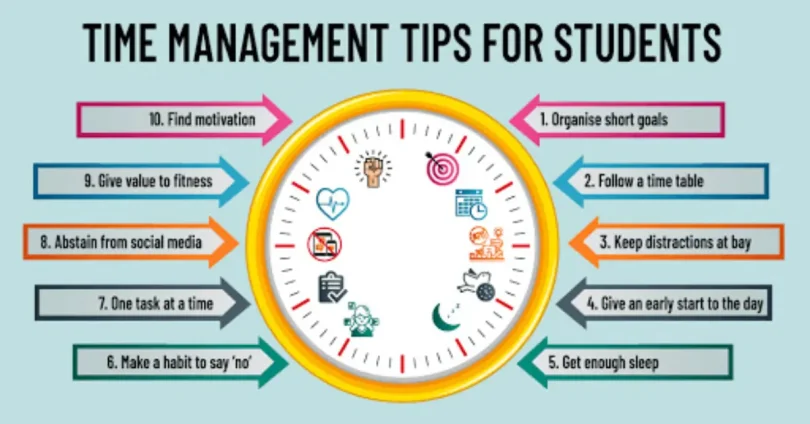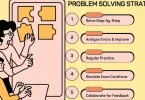Introduction
Time is one of the most valuable resources students have—but also one of the easiest to waste. Between classes, assignments, exams, extracurriculars, and personal responsibilities, it’s easy to feel overwhelmed and fall behind.
That’s where time management comes in. Time management is the ability to plan and control how you spend your hours to accomplish your goals efficiently. For students, mastering this skill can lead to better grades, reduced stress, and more free time.
The purpose of this blog post is to share practical, easy-to-follow time management tips that students can start using right away. Whether you’re in high school, college, or balancing school with work, these strategies can help you stay organized, focused, and in control of your schedule.
Why Time Management Matters for Students

Effective time management is more than just keeping a calendar—it’s a foundational skill that impacts nearly every aspect of a student’s academic and personal life. Here’s why it matters:
1. Academic Benefits
Time management helps students stay on top of assignments, prepare for exams, and avoid last-minute stress.
- Meeting deadlines: With a clear plan, students are less likely to forget due dates or cram at the last minute.
- Improved performance: Regular study habits lead to deeper understanding and better retention, which can boost grades.
2. Personal Benefits
Managing time well doesn’t just benefit academics—it also improves overall well-being.
- Less stress: Having control over your schedule reduces anxiety and helps you feel more prepared.
- More free time: Efficient time use creates room for hobbies, relaxation, and social life—without guilt.
3. Long-Term Skill Development
Time management isn’t just a school skill—it’s a life skill.
- Career readiness: Employers value people who can prioritize, meet deadlines, and manage tasks independently.
- Lifelong value: Whether managing projects, parenting, or personal goals, strong time management will continue to pay off well beyond school.
Common Time Management Challenges Faced by Students
Even with the best intentions, students often struggle to manage their time effectively. Recognizing these common obstacles is the first step to overcoming them.
1. Procrastination
Putting off tasks until the last minute is one of the biggest time-wasters. It leads to rushed work, higher stress, and lower-quality results. Procrastination often stems from fear of failure, perfectionism, or simply feeling overwhelmed.
2. Distractions
Phones, social media, streaming platforms, and even noisy environments can easily derail focus. A five-minute scroll can turn into an hour lost—without you realizing it.
3. Poor Planning or Over-Scheduling
Without a clear schedule or to-do list, it’s easy to forget tasks or underestimate how long something will take. On the flip side, packing your schedule too tightly can lead to burnout and missed deadlines.
4. Lack of Motivation or Burnout
When students feel mentally exhausted or disconnected from their goals, it becomes difficult to stay productive. Burnout can make even simple tasks feel overwhelming, leading to avoidance and time mismanagement.
Time Management Tips for Students

Mastering time management takes more than good intentions—it requires clear strategies and consistent habits. Below are ten actionable tips students can start using right away.
4.1 Set Clear Academic and Personal Goals
Setting goals gives your time a purpose. Without them, it’s easy to stay busy without making real progress.
- Use SMART Goals:
- Specific: What exactly do you want to achieve?
- Measurable: How will you track progress?
- Achievable: Is your goal realistic?
- Relevant: Does it align with your priorities?
- Time-bound: Set a clear deadline.
4.2 Use a Planner or Digital Calendar
Plan your day, week, and month to stay organized and avoid last-minute stress.
- Daily planning: Schedule tasks, classes, and study blocks.
- Weekly/monthly planning: Map out deadlines, exams, and big projects.
- Recommended tools: Google Calendar, Notion, MyStudyLife, or a physical planner.
4.3 Prioritize Tasks Wisely
Not all tasks are equally important. Use a method to rank and tackle them efficiently:
- Eisenhower Matrix: Urgent vs. important tasks.
- ABCDE Method: Label tasks A (highest priority) to E (eliminate).
- Pareto Principle (80/20 Rule): Focus on the 20% of tasks that produce 80% of results.
4.4 Create and Stick to a Daily Routine
Routines reduce decision fatigue and create structure.
- Sample student routine:
- 7:00 AM – Wake up
- 8:00 AM – Class/study
- 12:00 PM – Lunch/break
- 1:00 PM – Assignments
- 5:00 PM – Free time or hobbies
- 9:00 PM – Review next day
- Benefits: Consistency helps with energy management and habit formation.
4.5 Avoid Multitasking
Multitasking decreases efficiency and weakens focus.
- Single-tasking: Focus on one task at a time for deeper work.
- Tip: Silence notifications, close unnecessary tabs, and use full-screen mode.
4.6 Use Time Blocking and Pomodoro Technique
Structure your study sessions and breaks:
- Time Blocking: Assign specific blocks of time for specific activities (e.g., 10–11 AM: revise biology).
- Pomodoro Technique:
- Work for 25 minutes
- Take a 5-minute break
- After 4 cycles, take a longer break (15–30 minutes)
4.7 Eliminate Distractions
Control your environment to stay focused.
- Digital detox: Turn off non-essential notifications; keep your phone in another room.
- Helpful tools:
- Forest (for focus)
- Cold Turkey or Freedom (block apps/sites)
- StayFocusd (Chrome extension)
4.8 Break Large Projects into Small Tasks
Big tasks can feel overwhelming—breaking them down makes them manageable.
- Create mini-deadlines for sections of a project or paper.
- Use checklists or templates to track progress and stay motivated.
4.9 Use Technology for Better Planning
Apps can simplify and automate your planning process.
- Popular tools:
- Todoist: Create prioritized to-do lists
- Trello: Visual task boards for tracking projects
- Notion: All-in-one workspace for tasks, notes, and calendars
- Google Calendar: Great for visual time blocking and reminders
- Set reminders and recurring tasks to build long-term habits.
4.10 Reflect and Adjust Weekly
Make time to review what’s working and what’s not.
- Weekly review questions:
- Did I meet my goals?
- What caused delays or distractions?
- What can I improve next week?
- Track habits and adjust your routine based on results.
Time Management Hacks for Busy Students
When your schedule is packed, you need smart shortcuts that help you stay on track without burning out. Here are four time-tested hacks every busy student can use:
1. The Two-Minute Rule
If a task takes less than two minutes, do it immediately.
- Examples: Replying to a quick email, organizing notes, checking a due date.
- Why it works: It keeps small tasks from piling up and cluttering your to-do list.
2. Time Batching
Group similar tasks together and tackle them in one focused session.
- Example: Batch all reading assignments, email replies, or study reviews into set blocks.
- Benefit: Minimizes mental switching and increases productivity by staying in the same “zone.”
3. Learn to Say “No”
Overcommitment kills focus and energy. It’s okay to decline extra responsibilities when you’re at capacity.
- Tip: Be polite but firm. Prioritize what aligns with your academic or personal goals.
- Remember: Saying “no” to one thing is saying “yes” to something more important.
4. Study During Your Most Productive Hours
Figure out when you’re most alert—morning, afternoon, or evening—and reserve that time for your hardest subjects.
- Track your energy and focus levels for a week to find your peak hours.
- Use low-energy times for lighter tasks like organizing or passive review.
you may also like to read these posts:
Best Business Computers in 2025: Performance & Reliability
Powerful & Compact: Best Portable Mini PCs for Work
Exploring Various Budgeting Strategies to Take Control of Your Money
Exploring Digital Learning Platforms: Types and Their Educational Purposes
Effective Time Management Tips for Students to Stay Organized
How Good Time Management Improves Student Life
Mastering time management isn’t just about getting more done—it transforms the student experience in meaningful, lasting ways. Here’s how:
1. Boosts Academic Performance
Organized students are more likely to meet deadlines, prepare thoroughly for exams, and produce higher-quality work. With consistent planning and time allocation, academic success becomes more achievable and less stressful.
2. Reduces Anxiety and Burnout
Last-minute cramming and missed deadlines can lead to constant stress. Effective time management spreads the workload evenly, helping students stay calm, focused, and better equipped to handle pressure.
3. Improves Self-Discipline and Confidence
Consistently managing time builds self-control and a sense of accomplishment. Over time, students become more independent, motivated, and confident in their ability to handle responsibilities.
4. Creates Time for Hobbies and Self-Care
Efficient planning frees up space in your schedule—not just for school, but for the things that bring joy and balance. Whether it’s reading, exercising, socializing, or relaxing, good time management allows students to enjoy life outside academics.
Mistakes to Avoid in Time Management
Even with the best intentions, some common pitfalls can undermine your time management efforts. Being aware of these helps you stay on track and make real progress.
1. Over-Planning Without Execution
Spending too much time creating perfect schedules without actually following through can waste precious time. A plan is only useful if you act on it.
2. Ignoring Rest and Downtime
Skipping breaks or rest leads to burnout and decreased productivity. Balance focused work with regular downtime to maintain energy and focus.
3. Not Tracking Your Time Realistically
Underestimating how long tasks take can lead to frustration and missed deadlines. Track your actual time spent to improve future planning accuracy.
4. Rigid Schedules Without Flexibility
Life is unpredictable. A schedule that doesn’t allow for adjustments can cause unnecessary stress. Build in buffer times to accommodate unexpected events or changes.
Faqs:
What is the best time management strategy for students?
The best strategy varies by individual, but setting clear goals, prioritizing tasks, and using techniques like time blocking or the Pomodoro method are highly effective.
How many hours should a student study per day?
It depends on the student and their workload, but generally, 2-4 focused hours of study per day, broken into manageable sessions, is recommended.
What are some free tools for student time management?
Popular free tools include Google Calendar, Todoist, Trello, and Notion, which help organize tasks, schedules, and reminders.
How do I avoid procrastination?
Break tasks into smaller steps, eliminate distractions, set deadlines, and use productivity techniques like the Pomodoro method to maintain focus.
Can poor time management affect mental health?
Yes, poor time management can increase stress and anxiety, lead to burnout, and negatively impact overall well-being.
Conclusion:
Effective time management is a crucial skill that can help students achieve academic success while maintaining a healthy balance between studies and personal life. By setting clear goals, prioritizing tasks, and using proven strategies like time blocking and minimizing distractions, students can boost productivity and reduce stress. Remember, mastering time management takes practice, but with consistent effort, it can transform your student experience and set you up for long-term success.




